The first versions of Google, Facebook, YouTube and other IT monsters (and what they can teach you in terms of developing their own business)
- Transfer
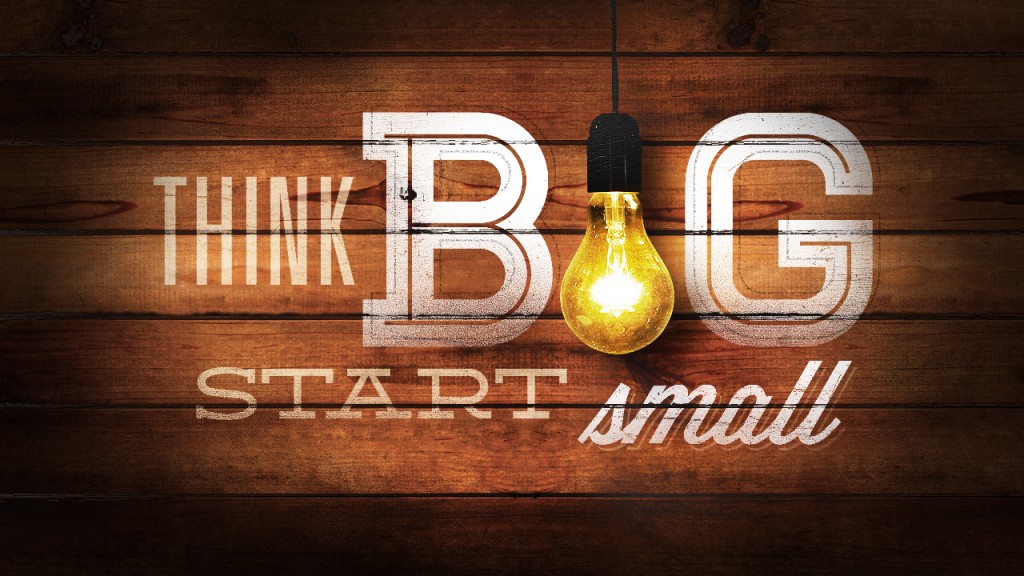
“The best we know and love started with small things,” said Joel Gascoigne . Buffer
CEO Joel Gascoigne recently wrote a post about the importance of starting small new projects. He remarked remarkably that looking at the finished product, which is the result of someone’s hard work, you can forget about how much time it took its creators to be at this point: “It’s really difficult for us to understand how the evolutionary process of products and brands contributes to the construction of what they are today and is vital for companies. ”
Joel says that the likelihood of success increases if we bring to mind small projects. Start small and let your projects grow, and grow significantly.
“Don't even try to build startups. These are premature intentions. For starters, build what seems interesting to you. ”- Paul Graham
In order to see how simple the titans of the IT industry were at the beginning of their lives, I suggest you take a ride on a time machine, looking into the past. Design cannot tell us everything that happened “behind the scenes” of the company, but it will help us to track the development of a product or service over time. In addition, each of the creators has useful information on why they themselves started small, and how this helped them grow and achieve success.
So, let's follow how these companies evolved from modest projects into powerful giants of IT business:
Facebook - “Work for the Long Term”
“I am here to build something in the long run. Everything else is just fun. ”- Mark Zuckerberg
Zuckerberg had big goals: he wanted Facebook to help build and strengthen social connections between people around the world. And despite the fact that it all started with a small solution, covering only college students, Facebook has grown into one of the largest and most popular (today) social networks. Facebook continues to grow until now, because its creator has been working on building the company for a long period of time:
“I know that this may sound sentimental, but I would like to improve people's lives, especially in the social aspect ... And to make the world more open - it's not just one day. It will take 10-15 years. ”
2004

Today, Facebook has become bigger and much more complicated than it was at the very beginning, but Zuckerberg remains true to his ideas:
“Many of Facebook’s fundamental principles are based on the fact that people's access to additional information and stronger connections between them will make this world a better place, how people will understand each other better and become more compassionate. For me, this is a fundamental principle. In difficult days, when I am ready to retreat, this faith helps me move forward. ”
2013

Google - Focus on One Goal
“When Sergey and I founded Google, we hoped, but did not assume, that the company could reach such a size and gain the influence that it has today. We were only very interested in helping people find information more efficiently, ”Larry Page.
1998

For many years, Google’s design has remained fairly minimalistic, even though the company’s activities have expanded significantly, and new services such as Maps, YouTube, Gmail and Drive have been added. And now when you enter the Google homepage, it’s clear that Google is still focused on one thing: effective information retrieval.
“Speaking of Google, we try to meet the needs of our users as quickly as possible,” - Larry Page.
2014
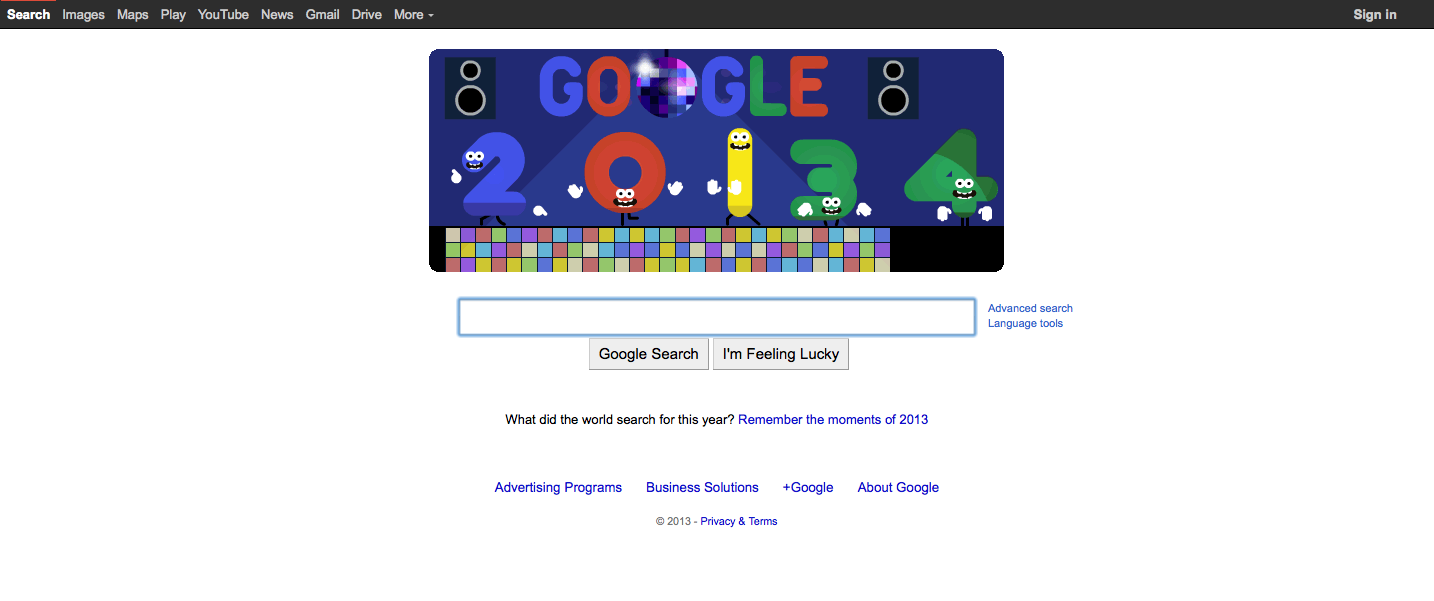
Tumblr - “Make It Yourself First”
Tumblr founder David Karp created the service to meet his own need. Blogging has become increasingly popular, but it focused on writing texts - something that not everyone would like to do, as David correctly pointed out.
“You are given this huge white field into which you need to enter a witty headline that will convince people to go ahead and read your post. The post, in turn, should consist of several paragraphs of text correctly formatted in HTML with small images (do not forget about alignment). And it must be really well written and edited material, ”- David Karp.
2007
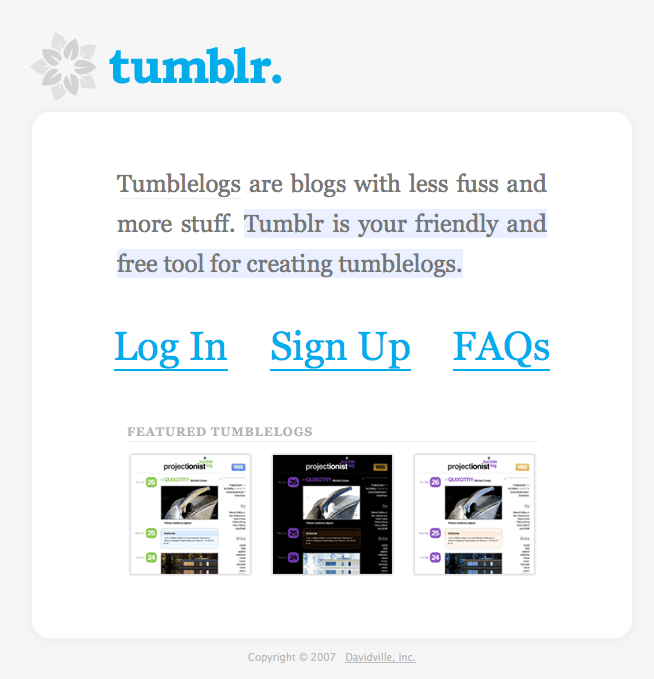
Today, Karp associates the success of Tumblr not only with the idea of using “more chips” (including photos and GIFs), but also with the fact that the team is focused on creating something that they love and use:
“It seems to me that one of the most important The features that Tumblr has been able to maintain to this day is that it is still the product that our team creates primarily for themselves and happily uses every day for hours. And I would like to believe that this not only has a beneficial effect on the product, but also helps us not to forget about its main purpose, not to deviate from the course. And this, in my opinion, preserves its original concept. ”
2014

YouTube - “Don't Think You Know Everything”
The YouTube team is committed to testing their designs and creating products based on how they attract people based on previous experience:
“We had a lot of our own ideas about how the service should develop. Speaking of PayPal and eBay, it seemed to us that YouTube could be a great way to add videos to products at auction, but we found that no one uses our product in this way, so we did not add the corresponding features, ”- Chad Hurley (Chad Hurley).
2005
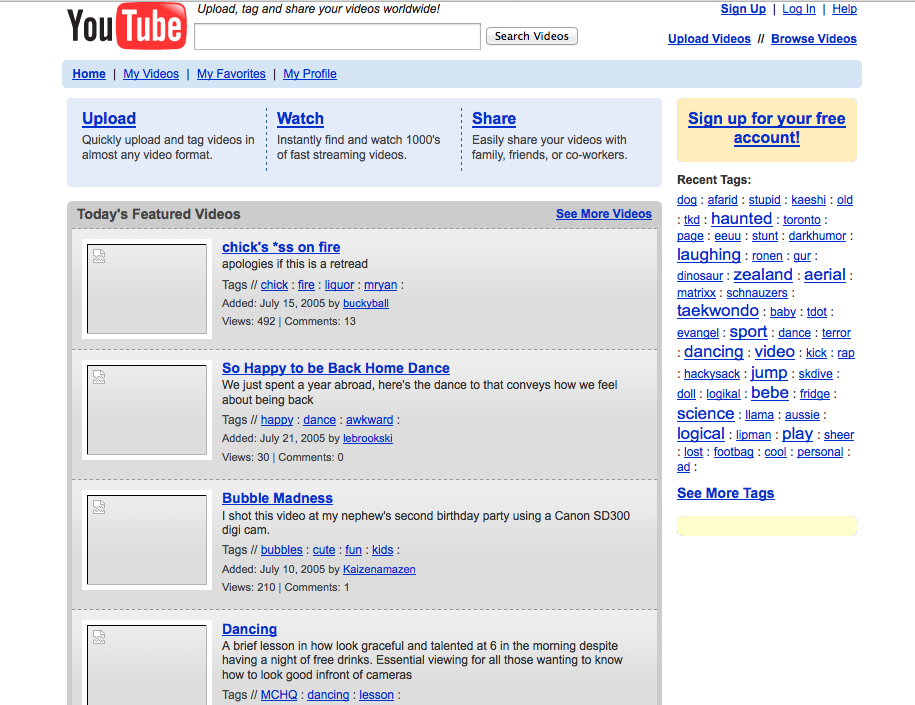
YouTube co-founder Chad Hurley advises startup founders to test their assumptions and listen to users, rather than grab the first step in developing a large, complex product based solely on your vision.
When you start creating a product, don’t assume that you know everything. Listen to users and adapt.
2014
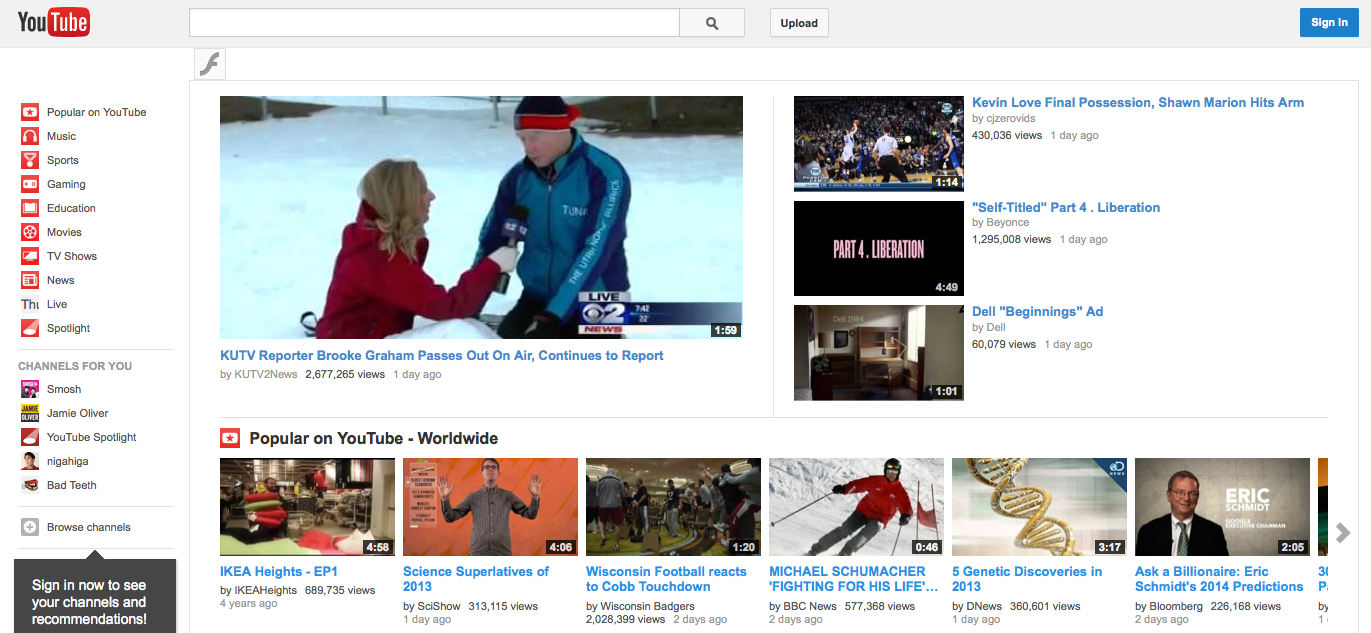
Yahoo! - “Be prepared for growth”
Like most of the above companies, Yahoo! began its existence as a very small project aimed at solving a specific problem: the future founders of Yahoo! had trouble finding websites that they wanted to visit later, so they started cataloging web pages.
“We named the Jerry's Guide to the World Wide Web. We didn’t have time to blink, as people from all over the world began to use the database we created, ”- Jerry Yang.
1996

Based on his personal experience, co-founder Jerry Young advises preparing to expand his business:
“It seems to me that you should prepare your business for growth. And if the business model will not be able to provide rapid scaling of your project, then in the end nothing will come of it. ”
2014

Amazon - Put Your Customers Above All
“All our innovations begin with customers and are developed based on their needs. This is becoming our standard in how we invent something. ”- Jeff Bezos
Amazon creator Jeff Bezos argues that customer focus has been and remains Amazon’s best competitor advantage from the start:
“We had three key Amazon development ideas that we have been faithful for 18 years, and they are the reason for our success: Start with customers. Create. Be patient. ”
1999
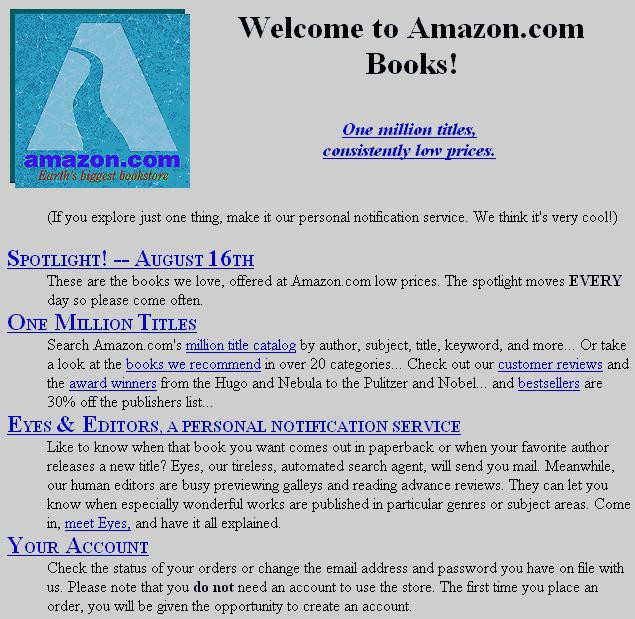
From an online bookstore, Amazon has grown into a huge online site selling almost everything. But even despite incredible growth, Bezos continues to focus on what customers want:
“Taking a morning shower, competitors think about how they are going to surpass one of their main competitors. At these moments, we are thinking about how we are going to create something new, trying to look at it through the eyes of the client. ”
2014
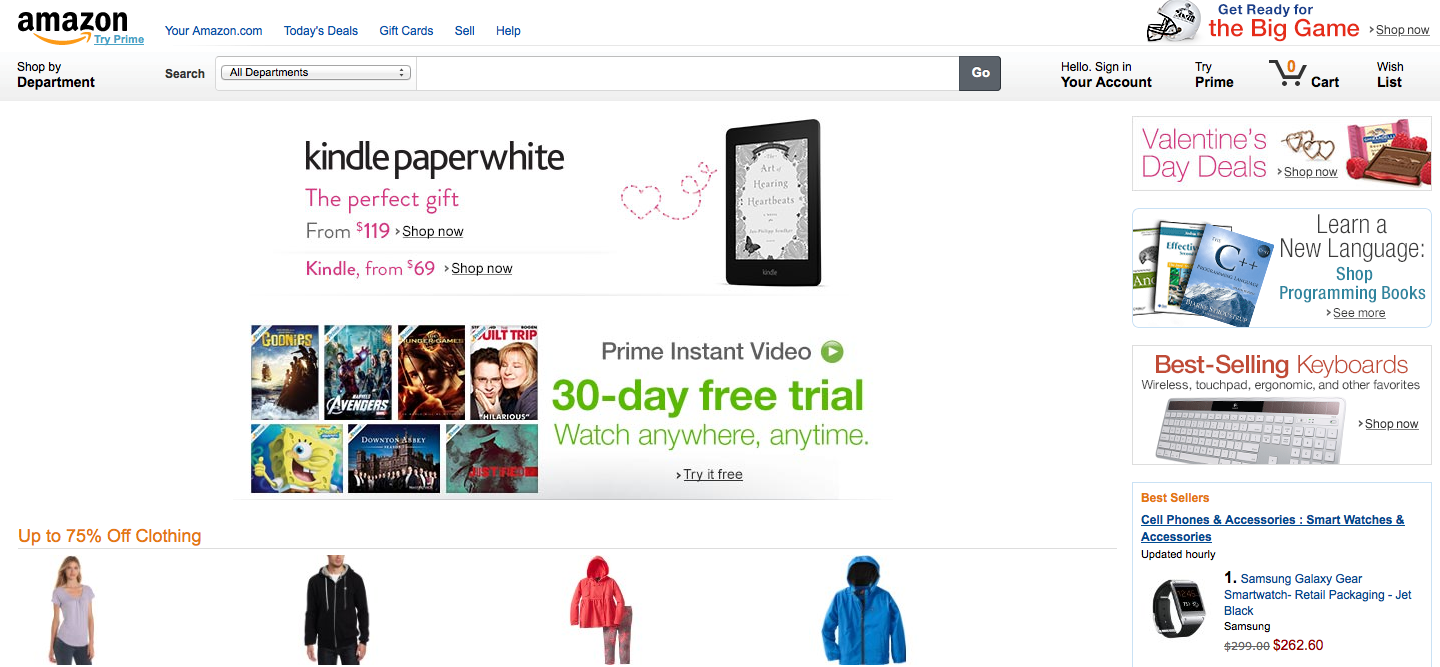
There are many examples of how large companies today started small. In his article, Joel Gascoigne cited Dale Carnegie's book, How to Win Friends and Influence People, which began with a short conversation and writing on a piece of paper.
Another example that I really like is the Sunrise startup , which appeared as a daily email newsletter and has now become a full-fledged calendar for the iPhone.
